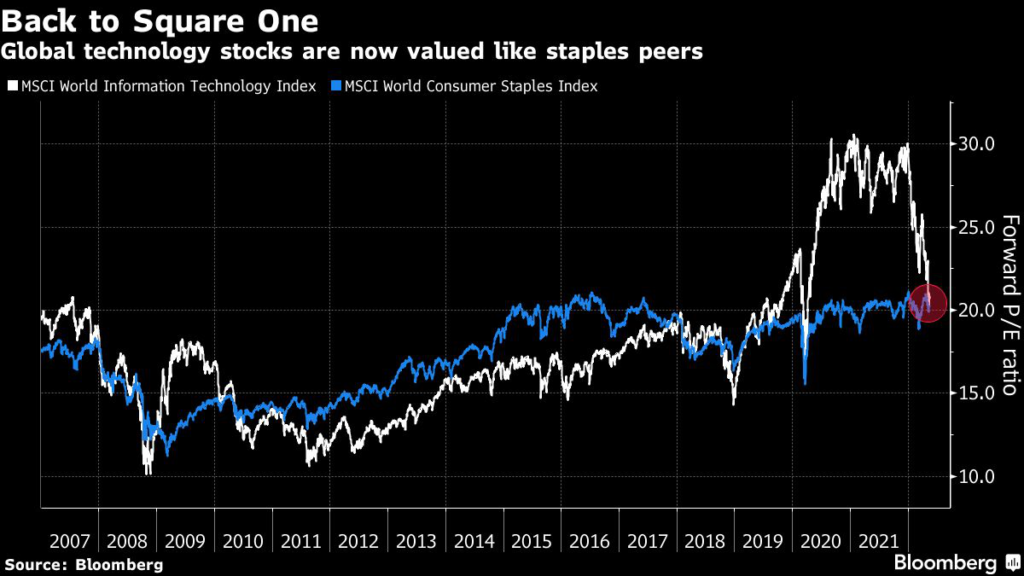(Bloomberg) — A rally in stocks cooled Wednesday amid a tough outlook in China and hawkish comments from Federal Reserve Chair Jerome Powell.
MSCI Inc.’s Asia-Pacific equity index came off session highs, though it remained up for a fourth day, the longest such streak since February. US futures dipped after the S&P 500 added 2% in a risk rebound Tuesday.
Technology shares lead a decline in Chinese markets. The nation’s Covid lockdowns are weighing on sentiment along with concerns that officials aren’t doing enough to ease a clampdown on digital-platform firms.
Treasuries pared an overnight slide, leaving the US 10-year yield at 2.96%. Bonds came under pressure after Powell said the Fed “won’t hesitate” to tighten policy beyond neutral to curb high inflation. The dollar edged up.
Oil was trading around $113 a barrel and Bitcoin dipped below $30,000.
Rebounds in risk sentiment are proving fragile amid tightening monetary settings, Russia’s war in Ukraine and China’s Covid outbreak.
“We’ll have this kind of volatility as people jump in and look at opportunities to buy as markets decline,” Shana Sissel, director of investments at Cope Corrales, said on Bloomberg Television, referring to the Wall Street bounce. The Fed is going to struggle to achieve a soft economic landing, she added.
Powell said that the US central bank will raise interest rates until there is “clear and convincing” evidence that inflation is in retreat. The remarks at a Wall Street Journal live event were some of his most hawkish so far.
‘Challenging Markets’
Chicago Fed President Charles Evans said he expects the Fed to slow the pace of rate increases to 25 basis-point increments later this year. He anticipates it will complete any 50 basis-point hikes before December.
“This is one of the most challenging markets I have been in in my career,” Henry Peabody, fixed income portfolio manager at MFS Investment Management, said on Bloomberg Television. “I suspect at a certain point of time we’re going to have the liquidity of the markets challenged. They really haven’t been thus far.”
Elsewhere, the Biden administration is poised to fully block Russia’s ability to pay US bondholders after a deadline expires next week, a move that could bring Moscow closer to the brink of default.
What damage will be done to the US economy and global markets before the Fed changes tack and eases policy again? The “Fed Put” is the theme of this week’s MLIV Pulse survey. Click here to participate anonymously.
What to watch this week:
- G-7 finance ministers and central bankers meeting Wednesday
- Eurozone, UK CPI Wednesday
- Philadelphia Fed President Patrick Harker speaks Wednesday
- China loan prime rates Friday
Some of the main moves in markets:
Stocks
- S&P 500 futures fell 0.2% as of 1:13 p.m. in Tokyo. The S&P 500 rose 2%
- Nasdaq 100 futures fell 0.4%. The Nasdaq 100 rose 2.6%
- Japan’s Topix index added 0.8%
- South Korea’s Kospi index rose 0.1%
- Australia’s S&P ASX/200 Index increased 0.9%
- Hong Kong’s Hang Seng Index fell 0.6%
- China’s Shanghai Composite Index lost 0.4%
- Euro Stoxx 50 futures rose 0.1%
Currencies
- The Bloomberg Dollar Spot Index rose 0.1%
- The euro was at $1.0533, down 0.2%
- The Japanese yen was at 129.01 per dollar, up 0.3%
- The offshore yuan was at 6.7625 per dollar, down 0.3%
Bonds
- The yield on 10-year Treasuries fell three basis points to 2.96%
- Australia’s 10-year bond yield increased two basis points to 3.43%
Commodities
- West Texas Intermediate crude rose 0.9% to $113.37 a barrel
- Gold was at $1,809 an ounce, down 0.3%
More stories like this are available on bloomberg.com
©2022 Bloomberg L.P.











